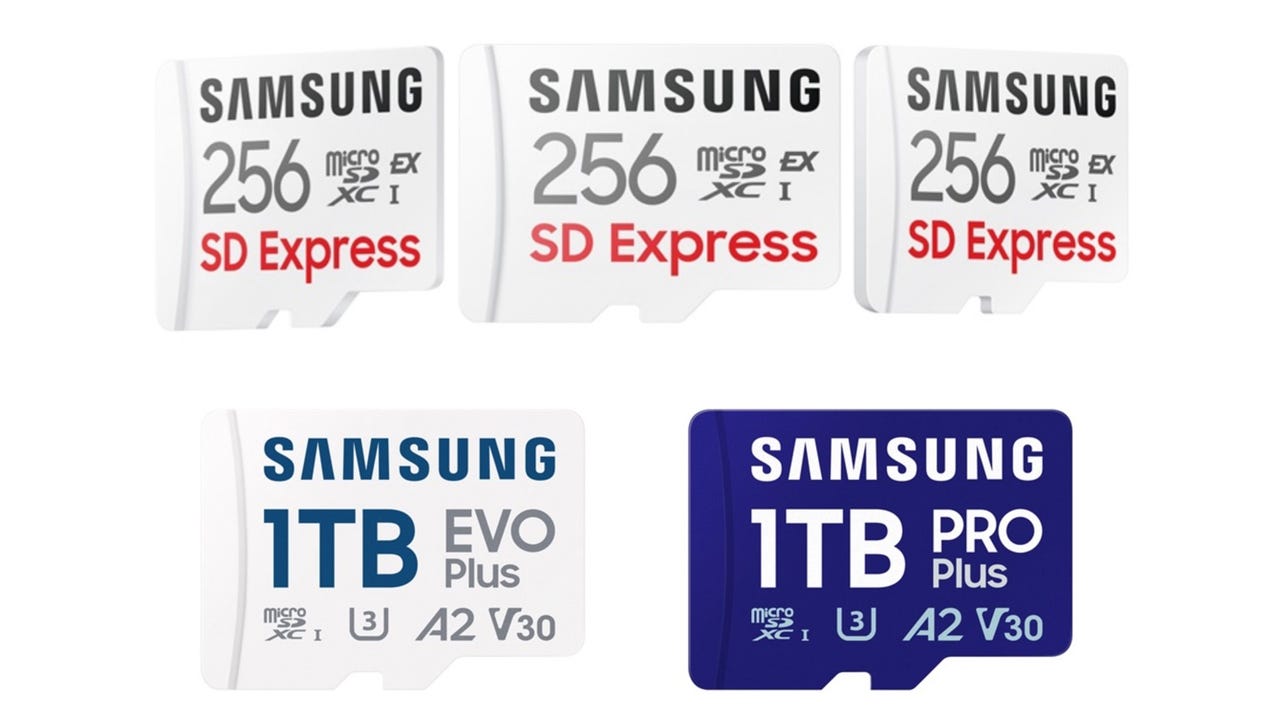Samsung just made microSD cards a lot faster - and tougher


Samsung 256GB SD Express microSD cards, 1 TB EVO and ECO Plus microSD cards
One of the biggest advantages that some Android smartphones have over the iPhone is the ability to expand the storage with a microSD card. If you find yourself running out of space, you pop out the SIM tray, pop in one of the diminutive storage cards, and away you go.
Whether it's a smartphone, or drone, or CCTV camera, microSD cards are everywhere.
Now, Samsung, one of the biggest names in storage, is taking microSD cards to the next level with two new advances that will make storage geeks salivate. (But here's the strange thing. Samsung is making some of the very best microSD cards available, but Samsung smartphone users won't benefit from this as the company hasn't included a microSD card slot in its flagship handsets since 2020.)
Also: The best microSD cards you can buy: Expert tested
The first advance is that the company has started sampling 256GB SD Express microSD cards. What sets these apart from all the other microSD cards on the market right now?
Speed.
These SD Express microSD cards can hit sequential read speeds of up to 800MB/s, which is 1.4 times faster than SATA SSDs, and a whopping four times faster than previous-generation UHS-1 storage media. And because such speeds are going to generate a lot of heat, and microSD cards are usually located in confined spots, these SD Express microSD cards make use of Dynamic Thermal Guard (DTG) technology to keep the temperatures at the right spot, and prevent overheating of the card, even when used for extended periods.
The downside of this is that this technology controls the temperatures by throttling the performance of the card, so real-world speeds are likely to vary depending on the device, use-case, and even ambient temperatures.
The only rub is that, while SD Express microSD cards are backward-compatible with existing microSD card slots, to get these speeds you'll need devices that are compatible with SD Express, and right now those are thin on the ground.
Also: What do all those microSD and SD card numbers and letters mean?
Samsung also announced that it has begun mass production of 1TB UHS-1 microSD cards that make use of the company's 8th generation 1-terabit V-NAND technology. According to the spec sheet, this is a tough card, with Samsung claiming that it can survive:
- Immersion in salt water up to 1 meter (3.3 feet) deep for 72 hours
- Operating temperatures of -25℃ to 85℃ (-13°F to 185°F), and non-operating temperatures of -40℃ to 85℃ (-40°F to 185°F)
- Standard airport x-ray machines (up to 100mGy)
- Magnetic fields equivalent of a high-field MRI scanner (up to 15,000 gauss)
- Drops up to 5 meters (16.4 feet)
- Up to 10,000 swipes in a microSD card slot
That's amazing!
Samsung's 256GB SD Express microSD card is slated to launch "later this year," while the 1TB UHS-1 microSD should land in the third quarter of 2024. There is no word on pricing for either card.